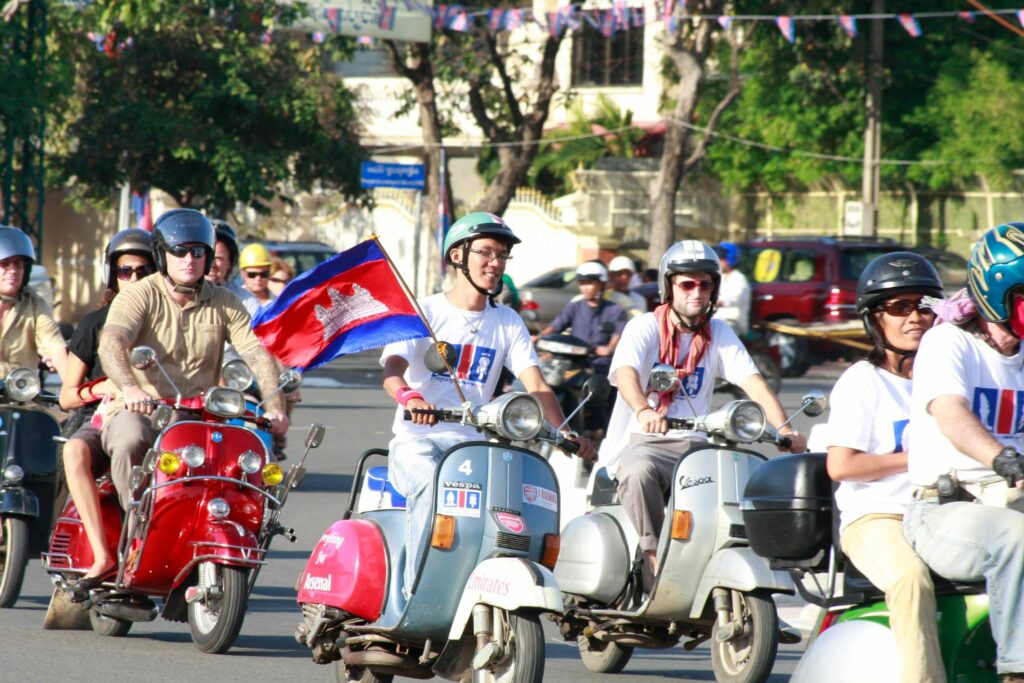Unofficial Translation from The Phnom Penh Post’s Khmer edition
TUESDAY, 9 FEBRUARY 2016,
TONG SOPRACH
គ្មានទេការបង្ខំរួមភេទរបស់យុវវ័យនៅថ្ងៃ ១៤ កុម្ភៈខាងមុខ !

The trend of the Cambodian young people’s attitudes towards the western Valentine’s Day, which is annually celebrated on 14 February, has notably changed, compared to the attitudes found 7-8 years ago, which saw the florist and gift stands emerging around schools and along the street.
Not so far from those stands were young couples, riding on their bikes and showing off their Valentine’s roses and their presents.
The teen girls who got nothing on Valentine’s Day were usually mocked for having no “boyfriend” or “admirer”. This has become a pressure for those girls, making them more likely to be involved in the celebration and lead a chance for young males to take advantage for the premarital sexual intercourse on that day.
Moreover, young men are always bragging to each other with sexual desire to their friends about how they would prepare for their lovemaking with their girlfriends how they would accompany their girlfriends to the hotels or guesthouses they have booked way before the special day.
This tendency, however, has seemed to decrease over the years. The Alternative name “Lover’s Day” has been replaced by “The Day of Love” among people and the rose and gift stands around the schools have been removed. On that day, young men seem shy if seen holding roses, and the rose held by young women are given away in restaurants or boutiques.
Recently, on Valentine’s Day, the public witnessed charitable activities such as giving something to the poor and AIDS patients, donating blood and expressing love and gratitude to parents and teachers. Such transition resulted from the hard work of researchers, reporters, and educators who work in the field as well as some particular institutions including the Ministry of Education, Ministry of Women’s Affair and Ministry of Culture and Fine Art. NGOs and parents have to be included in the list as well.
Although the Education Ministry, according to the deputy director of Health and Education Department, Dr. Yong Kunthearith, has included the lesson about sexual and reproductive health and rights in the curriculum from grade 5 to grade 11, starting from the 10 provinces and municipalities) this has barely shown any change in the sexual attitudes of young people in the Kingdom. Out of 715 samples interviewed, 12 per cent in 2009 and 11 per cent in 2014 said that they plan to have sex on Valentine’s Day. Worse, 30 percent of them (n=43/N=715) would not use protection (Soprach, 2014).
This finding is similar to the result of the research on student’s general health behavior/attitudes among adolescences aged 13-17, stating that 12 per cent of them have already been involved in sexual intercourse, and among those, only 33 per cent used condoms (MOH/MOEYS/WHO/CDC, 2013).
However, the researcher who works on the Young People Sexual Relationship toward Valentine’s Day has shown the concern that young men would force their girlfriends or new girlfriends to have sex with them as the report pointed to 47 percent of young males planning to have sex on February 14 (n=61/N=715) (Soprach, 2014).
The reasons for having sex, in the meantime, have notably increased. Some men who said they would not engage in non-consensual sex said “No, I will ignore sex, and just hang around for fun”. However the distribution of reasons attempt for sex increased markedly: “I will say to her if we don’t have sex we don’t really love each other, to try to get her to agree”, “I will pressure her by taking her far from town to try to have sex with her”, but it only appeared this upcoming Valentine’s Day 2014. Amongst young males and young males living in a relationship, many stated: “I will give her more expensive gifts with the aim of having sex with her”. (Soprach, 2014).
These responses resulted in a case study conducted by Marie Stopes International. A case study which provide sexual and reproductive health consultations and abortion services, in which a teen girl have given up her education due to the forced premarital sex by her boyfriend on Valentine’s Day in 2011. She became pregnant and left by her boyfriend, leading to her abandoning the dream of becoming a financial official at a bank and thus instead returning to her family’s small business. Meanwhile, her so-called boyfriend denied any responsibility, saying that he could not afford having a baby. This is an example of a young, innocent girl whose future was ruined by her boyfriend pressuring her into sex by stating that “not having sex with me means she is not faithful” Cockroft & Svaypich, 2012).
There are still many young men who consider themselves “Casanovas” and call the girl they already make love with “Food already, ate, Leftover”. That is, undoubtedly, a form of gender discrimination, which has existed since the teenage stage.
In addition, sexual relationship is a sensitive and complicated matter. Not many are brave enough to speak about it out loud unless it becomes a legal issue or revenge. An example of that is the last year’s case of acid attack by a teen girl on her ex-boyfriend due to break engagement (the boyfriend’s family said). In this case the police officers went on to track the attacker. Is this case questionable? In Cambodia, premarital sex is a serious deviance, and the girl may take her revenge if she found the experience too painful.
However, the Ministry of Education always releases a guideline letter which tell the teenagers to not be confused and that Valentine’s Day is not the “Day of Lovers” or “Day of Sex”.. the letter does not only affect the public schools but also the private schools, who has contributed to the prevention of the spectaculation on this day and has given students more information on sexual and reproductive health and rights. According to Keo Lundy, the deputy director of American Intercon School (AIS), 500 of his students have already registered for “Run for share love!” event organized in Koh Pich on February 14 this year by the Women and Sport commission.
In conclusion, reproductive and sexual rights are the choice made by our young people. If they are involved in having sex on the day, have they considered the risk of pregnancy or STDs/HIV/AIDS transmission? Do they know how to have protected sex? Will they be brave enough to look for consultation services from RHAC or Marie Stopes if they get pregnant?
If you suspect that you have transmitted HIV/AIDS from your partner, where can you get the right health services? Regarding all young men, do you prefer forcing your girlfriend to have sex for fun just for one day, or wait until marriage?
Tong Soprach is a social-affairs columnist for the Post’s Khmer edition.
Comments: [email protected]
